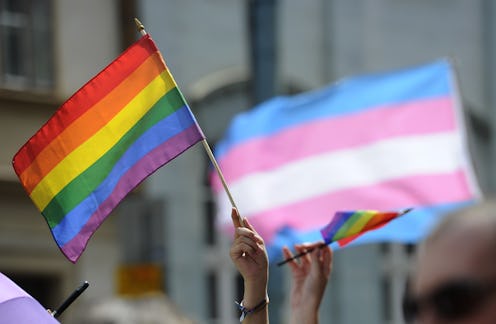Life
Americans Remain Split On Trans Restroom Access
In case you needed a reminder that the Supreme Court's ruling on same-sex marriage didn't fix all the problems facing the LGBTQ community, a recent survey by the Pew Research Center has found that just half of Americans support transgender bathroom access according to gender identity, rather than biological sex. The finding comes as part of more general research into public attitudes toward the intersection of religious liberty and nondiscrimination, a topic which, between the rash of so-called "bathroom bills" in the spring and the 2016 presidential election, has been debated frequently this year.
The survey asked more than 4,500 American respondents about their attitudes toward three issues: Transgender bathroom access, the ability for a business to refuse to serve a same-sex wedding, and whether employers should be able to refuse to cover birth control through health insurance. On the bright side, more than two-thirds of Americans (67 percent) support employer coverage of birth control despite religious objections.
However, respondents were evenly split when it came to the other two areas. 48 percent of respondents said that businesses should be able to turn away same-sex couples for religious reasons, while 49 percent said they should be required to provide services anyway. Furthermore, as mentioned above, just over half (51 percent) of respondents agreed that transgender people should be allowed to use a bathroom corresponding to their gender identity, while 46 percent said that transgender people should be required to use the bathroom corresponding to the gender they were assigned at birth. White, churchgoing evangelicals were the most likely to support the latter view.
In news that will come as no surprise to anyone familiar with American politics, respondents were fairly polarized. 30 percent said they sympathized only with those who support restrictions on bathroom access, and similarly, 32 percent said they only sympathized with those who support access based on gender identity. Overall, just 18 percent said they could see where both sides were coming from.
In keeping with past findings, there were clear generational divides. Younger people were more tolerant of transgender bathroom access, with two-thirds of respondents between 18 and 29 years old agreeing that it should depend on gender identity. In contrast, researchers wrote that respondents over 30 years old were "much more divided" on the subject. The younger generation was more liberal in general; they were more likely to say that employers should cover birth control and service same-sex couples no matter their religious affiliation. There was a gender divide as well: Women (72 percent) were far more likely than men (62 percent) to say employers should be required to cover birth control. To a lesser degree, they were also more likely to support transgender bathroom access and requiring businesses to serve same-sex couples.
But at least it's not all doom and homophobic, transphobic gloom; the report also found that about 20 percent of American adults said their views on homosexuality had changed in the last few years, most of whom reporting becoming more accepting. The best part? One of the most common reasons for this shift was knowing someone who was gay or lesbian and "coming to the belief that people are free to live their lives however they choose." Previous research has shown the same thing: In 2009, a survey found that people who knew someone LGBTQ were more likely to support same-sex marriage. More recently, according to a 2013 Pew report, 92 percent of LGBTQ Americans say society has become at least marginally more accepting toward their sexuality or gender identity.
Obviously, this doesn't mean it's easy being LGBTQ, even in 2016. Earlier this year, the Human Rights Campaign predicted that 2016 would a difficult year for transgender rights, and time has proven them correct. Furthermore, this month's report paints a picture of an America divided on transgender rights — 10 years ago, however, it's likely that supporters of bathroom access would have been a minority rather than half the population. There's still a long way to go, but hopefully 10 years from today, it won't be an issue at all.
Images: Giphy (2)
